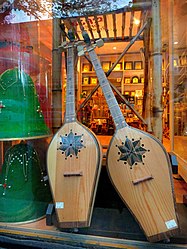music.wikisort.org - Instrument
The panduri (Georgian: ფანდური) is a traditional Georgian three-string plucked instrument common in all regions of Eastern Georgia: such as Pshav-Khevsureti, Tusheti, Kakheti and Kartli. The panduri is generally used to accompany solo heroic, comic and love songs, as well as dance. It is typically played by men.[1]

 | |
| String instrument | |
|---|---|
| Classification | Plucked string instrument |
| Related instruments | |
Tuning
- Three-stringed panduri: G-A-C# or E-B-A# or A-C#-E
- Two-stringed panduri: D-C#[2]
Construction
The frets on the panduri are traditionally made of wood inlaid in the fingerboard, usually seven frets to an octave, but nowadays chromatic fretting with metal frets can also be found. The body of the panduri is usually made more in the shape of a spade, less often with a parallel sided endblock. It is traditionally carved from a single block of wood, but a staved construction (like a lute) is also common.[1][3]
- Back view of panduri with body made of ribs
- Front view of panduri with body made of ribs
- Georgian panduri (carved version) from back
Variants and related instruments
The panduri is a three-stringed lute from the highland and lowland regions of eastern Georgia, usually played by strumming, and often for choral and rhythmic support of vocal melody.[4][5]
There are two kinds of panduri in Georgia: one is the traditional "folk" panduri, which typically has seven frets and more closely approximates the scale divisions in the non-Western Georgian scale system. The second kind is the "chromatic" panduri, which has the same tonal divisions as a guitar and is capable of reproducing all the half-steps of the tempered Western scale.[4] It is also sometimes found in Western Georgia (Upper Imereti and Racha). The two-stringed panduri survives in Khevsureti.[2]
Sometimes the panduri is also mistakenly called a "chonguri" - but the chonguri is a completely different instrument which comes from western Georgia; it is fretless, and it has a fourth, half-length drone string. Additionally, the chonguri is an instrument mainly played by women, while the panduri is usually played by men.[4][5]
A similar instrument is found in Chechnya,[6] where it is known as: phandar, pondar, ponder, pandir, pandur, dechig pondur, adkhoku pondur, dakhch pandr, or merz ponder.
See also
References
- "Panduri". Grinnell College Musical Instrument Collection. Retrieved 2019-05-17.
- "Georgian Musical Instruments – International Research Center for Traditional Polyphony". International Research Center for Traditional Polyphony. 5 March 2017. Retrieved 2019-05-17.
- Dolidze, Leah; Hannick, Christian; Dolidze, Dali; Chkhikvadze, Grigol; Jordania, Joseph (January 2001). "Georgia". Grove Music Online.
- Makharadze, Nino; Gabisonia, Tamaz (2019). "Georgia: History, Culture and Geography of Music". In Sturman, Janet (ed.). The SAGE International Encyclopedia of Music and Culture. Los Angeles, London, New Delhi, Singapore, Washington DC, Melbourne: SAGE Publications. p. 991. ISBN 9781483317748.
- Mikaberidze, Alexander (2015). Historical Dictionary of Georgia. Lanham, MA: Rowman & Littlefield. p. 485. ISBN 9781442241466.
- Zidan, Karim (11 October 2017). "The Warlords Who Rule Chechnya And Bahrain's Repressive Regime Are Bonding Over MMA". Deadspin. Retrieved 15 May 2019.
На других языках
- [en] Panduri
[ru] Пандури
Пандури (груз. ფანდური) — грузинский народный трёхструнный щипковый музыкальный инструмент типа лютни. Наиболее популярный народный музыкальный инструмент в восточной Грузии — Пшави, Хевсурети, Тушети, Кахети и Картли[1]. Пандури производится различных форм и размеров. Используется для сольного исполнения и сопровождения песни. Играют на пандури в основном мужчины.Другой контент может иметь иную лицензию. Перед использованием материалов сайта WikiSort.org внимательно изучите правила лицензирования конкретных элементов наполнения сайта.
WikiSort.org - проект по пересортировке и дополнению контента Википедии

